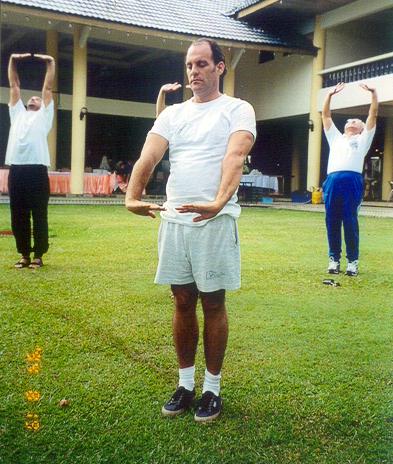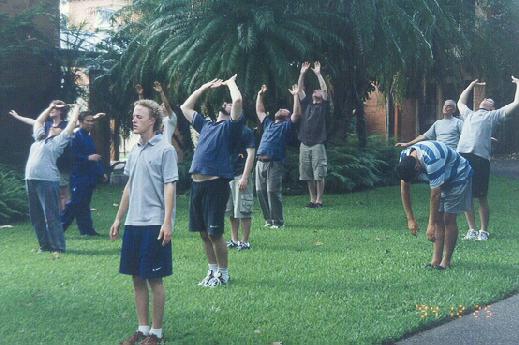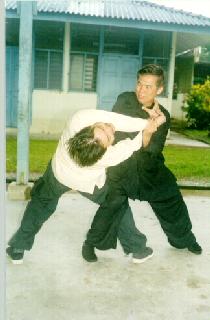July 2004 (Part 2)
SELECTION OF QUESTIONS AND ANSWERS

Students at an Intensive Chi Kung Course in Malaysia performing “Lifting the Sky”. In the foreground is Ismael Perez from Ecuador.
Question 1
I am 14 years old and have been interested in ESP, astral projection, spirits, etc since I was 11 years old. However, I was very young and the most I ever did was follow online instructions on how to develop psychic abilities. Although I did get some results, they were very minor and my interest in that area died within a year.
— Epitite, USA
Answer
ESP, astral projection, spirits and similar arcane topics are to be taken seriously under the supervision of a competent instructor. If you meddle with them by following online instructions it is easy to have very harmful side effects.
An essential requirement for anyone to be involved with arcane arts is to have high moral values. Many Western psychics have remarkable psychic powers, yet they are unhappy and some lead miserable lives. The main reason is that they did not have a solid moral base when they started their psychic training.
In Eastern culture such arcane arts are seldom practiced in isolation, but usually with spiritual training where high morality is a pre-requisite. Hence, even when these practitioners have tremendous psychic powers, they seldom use the powers. They always treat such powers with due respect, certainly not something easily obtained online by any Tom, Dick and Harry to be trifled with. Indeed, many spiritual cultivators in the East regard their psychic powers as a liability (which brings them heavy responsibility) rather than an asset.
It is of utmost importance that such psychic powers must always be used for good, and never for evil. It is legitimate to use such powers for one's own good, such as overcoming his own pain and illness, or increasing his own productivity but without causing harm to others.
Question 2
Recently I bought your book, “The Art of Chi Kung” and have been practicing the exercises in it for about a week. I often feel warm/tingly when I practice “Lifting the Sky” and “Carrying the Moon”, and after I am done, my body begins to sway without any effort on my part. Still, I find that I have trouble releasing all of my thoughts, emotions, and tension, but I hope that it will all come with time.
Answer
You have practiced the exercises correctly. Feeling warm and having tingling effect are common symptoms of chi having good effect on you. Your body swaying gently is the result of your being relaxed while chi flows inside your body. If you have some blockage, you may feel some dull pain as chi attempts to break through the blockage. This is what we call “good pain”.
If you just let go and do not think of anything as you enjoy your chi flow (while your body sways gently), the chi will also clear away your thoughts, emotions and tension. The instruction is simple, but it may not be easy for many people to carry it out. Thus learning from a master makes a great difference. Using subtle ways, the master can help the student let go of his negative thoughts, emotions and tension.
Question 3
I hope that chi kung will help me in fixing some of my problems. I am extremely shy and introverted, and although I do have a few very close friends, I have trouble interacting with others and can't hold a conversation with most people. I think I often have negative thoughts, and can't control my mind as much as I want to, and I think about things that I do not want to. I am also obese which of course has negative affects on my confidence and health. Do you think that practicing chi kung daily (and correctly) will improve the negative areas of my life?
Answer
Chi kung can help you to overcome your problems, but you have to practice genuine chi kung with energy and mind training, and not just external chi kung forms as gentle physical exercise. Genuine chi kung enhances your energy flow and energy level, which will give you confidence and courage. You will then be able to interact with others and hold conversations.
Chi kung will clear away your negative thoughts and focus your mind. You will then have better mental control and think of noble thoughts. Chi kung will also improve your appearance, including giving you a better body shape.

Students at an Intensive Chi Kung Course in Brisbane, Australia performing “Carrying the Moon”
Question 4
Since I am obese, I really hope that practicing “Drawing the Moon” daily will help me to lose weight. But will practicing this exercise only help me lose weight around my stomach or will it help me lose weight all throughout my body (face, legs, arms, etc)?
Also, what is the approximate time it would take me to see any minor results (such as a 10 pound weight loss), and should I at least try to control my diet somewhat, or to the point that I don't eat any foods with too much sugar such as candy?
Answer
“Drawing the Moon” is an excellent exercise to overcome obesity. It usually helps you lose weight around your stomach, but if other parts of your body (face, legs, arms, etc) are also obese, it will work on these parts too.
If you practice twice daily, increasing the number of rounds gradually, you should see minor results in two months, and remarkable results in six months. Actually you need not go on diet, but if you wish to control your intake of fattening food, that would speed up the results.
Question 5
I suffer from myopia. I have read that many people who attended your Chi Kung course have cured their myopia. I would love to attend your chi kung course, but I am only 14 years old, so I don't plan to do that until I am older.
Myopia probably shouldn't be a big problem with glasses and surgery, but I have extremely bad eyes. I don't know the exact number, but I do know that both eyes are worse than -7 and steadily getting worse with each week/month/year. I am afraid that at this rate, my eyes will be useless by the time I am finished with all of my studies. Do you know if practicing chi kung will improve my vision? Is there a specific chi kung exercise that will improve my vision?
Answer
Many people have thrown away their glasses after practicing chi kung learnt from me. If you cannot attend my classes, you can continue to practice the exercises you have learnt from my book. Practicing chi kung will certainly improve your vision.
You can also add the following exercises to your routine. Stand upright at a comfortable distance from a tree with green leaves, and be totally relaxed. Smile from your heart. Then count the leaves with your eyes. Start with 50 leaves, and gradually increase the number after a few days until you count 300 leaves. After counting leaves, roll your eyes in big circles 10 times each side. Perform these two exercises in the morning and in the evening every day.
Question 6
Finally, I want to thank you for writing your books on Chi Kung. I am impressed with the stories in your books, and after practicing chi kung for just a few days, I can sometimes feel chi throughout my body in daily life even when I am not thinking about it. I'm sure that with dedicated and correct practice, chi kung can help improve my life.
Answer
Some people have kindly referred to “The Art of Chi Kung” as a chi kung bible. All the stories in the book are true.
You can benefit much by practicing the exercises described in my books. But if you have an opportunity to learn from me personally, the benefits will be much, much more and better. Many people told me that they found the chi kung exercises explained in my books fantastic, but when they had attended my intensive courses, they said that there was no comparison between learning from me personally and learning from my books.
Practicing chi kung dedicatedly and correctly will surely improve your life. That is as sure as two plus two equals four. But you must practice genuine chi kung, not just gentle physical exercise that is often mistaken to be chi kung. The difference is not in the forms, but in the way how the forms are practiced.

All the three techniques of locking, throwing and breaking (the opponent's arm or elbow) are incorporated in this Wing Choon pattern called “Press Elbow”.
Question 7
My interests are locking, throwing and breaking. Is there an art that you would recommend that incorporates all three and if there is, is it as useful as traditional Kung Fu which has punching, kicking, some throws, some locks and some breaking.
— Jason, USA
Answer
All kungfu styles incorporate all these three categories of locking, throwing and breaking! Even styles like Hsing Yi and Wing Choon which emphasize striking, incorporate locking, throwing and breaking techniques, though many of their students may not know this.
On the other hand, most non-Chinese martial arts today, like Karate, Taekwondo, Wrestling, Western Boxing and Kickboxing, may be lacking in one or more of these categories of attacks. For example, in Karate you are not supposed to lock an opponent's elbow, in Taekwondo not to throw an opponent onto the ground, and in Kickboxing not to break an opponent's arm.
It may not be so surprising if you realize that kungfu is meant for real fighting, whereas the other arts are meant for sport and are necessarily protected by safety rules. Kungfu exponents are trained to poke their fingers into an opponent's eyes or smash their opponent's testicles, although normally they would not do that even in a real fight. But exponents of the other arts would not have such training, although, ironically, their sparring is typically more brutal.
If you realize this, you will also understand why cross-training is often regarded as a must by practitioners of these arts, but it is not required in kungfu.
Your question whether they are as useful as traditional kungfu is irrelevant because they are traditional kungfu, unless some instructors, being ignorant of their depth, discard their traditional kungfu features and adopt techniques from Karate, Kicboxing and other non-kungfu martial arts.
Question 8
I have gone through the procedures in websites to sit for a zen meditation. but I lack concentration due to sexual desires. Could you please give me your suggestions and guidance to practice meditation?
— Sabareesan, India
Answer
Meditation is an advanced exercise, and should be practiced under the supervision of a competent instructor. If you practice on your own, you should proceed slowly and gradually.
There are actually numerous types of meditation. There are also many different techniques. Being unable to concentrate is a common problem.
An excellent principle to overcome this problem is “to use one thought to represent hundreds of thoughts”. This one thought can be placed on a mantra or a simple phrase, an object in front of you, an image inside your mind, or a point in your body.
For example, you may gently and continuously recite a mantra like “Om Mani Padme Om”, or stare nonchalantly at a grain of sand in front of you, or gently focus your mind on an image of the Buddha or a Bodhisattva, or place your mind on your abdomen.
When thoughts arise, irrespective of whether they concern sexual desires or not, gently but firmly put the irrelevant thoughts aside, and gently focus on your one thought of the mantra, object, image or bodily point.
At first you will find the practice difficult, and your mind wander wildly. But if you persevere, practicing for a few minutes every day, after a few months of daily practice, you will find you can focus for longer and longer periods. You will also find yourself peaceful and happy.
LINKS
Selected Reading
- Such Amazing Beauty and Magnificience — Jorge Leon García
- Experiencing Satori at the Blue Mountain — Laura Fernández Garrido
- Enjoying Nature, the Evening Colours, the Wind, the Birds Singing — Inge Vandromme
- Shaolin Eighteen Lohan Hands
- Combat Sequence 15 — Farmer Hoes Rice Field
